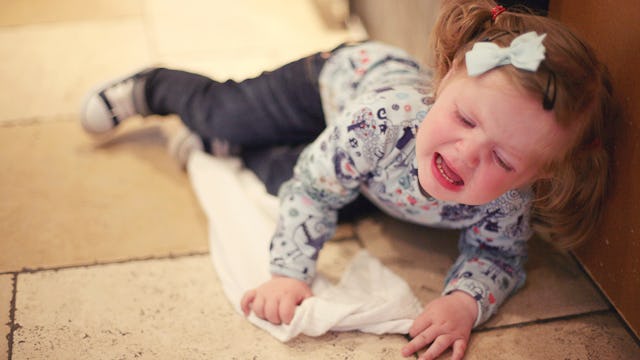News Flash: There's Nothing 'Wrong' With Kids Acting Like Kids

Letting a 3-year-old follow you on foot in Target is like taking a puppy for a walk without a leash: they stop every two-feet to investigate and might dart off at full-speed at any moment. I knew the risks, but honestly, I was too bleary-eyed to argue with my older daughter when she refused to ride in the cart. Plus, I had my tired five-month old to tend to as well. So I let my three-year-old daughter stroll through Target instead of riding in the cart.
She lingered by the fuzzy butterfly slippers and flashed me her best puppy dog eyes over an enormous container of Mega Blocks. Yet somehow, for 25 minutes, she summoned enough willpower to miraculously move along. Until we got to the check outline.
My little girl’s eyes locked on a super-sized bag of M&Ms placed right where she’d see them. Damn those whip-smart marketing people with their strategic displays of candies and sodas, unnecessary lip balms and guilty-pleasure magazines. Just as I was about to high-five myself for a successful outing with two small humans, the air shifted and I knew we weren’t going to make it.
“C’mon honey,” I said in my sweetest mama voice, a nervous smile plastered on my face. “No candy today. You don’t even like those anyway.”
She looked at me like I was out of my mind. What toddler doesn’t like tiny colored pieces of chocolate?
“I love them!” she wailed, then threw herself on the dirty floor and sobbed. The almost asleep baby woke with a start and added her cries to the melee. I abandoned my cart and bent down to talk to my older daughter who added kicking to her screaming while the baby squirmed against my chest looking for a boob.
And that’s when it happened. A man in what looked to be his sixties walked towards me scowling. “What’s wrong with her?” he demanded angrily, jabbing the air in my daughter’s general direction. “You need to get her out of here!” he yelled. Then he strolled away, leaving me slumped on the floor with my howling toddler and miserable baby.
I was stunned. Until that moment I hadn’t ever wondered if there was something wrong with my child. Sure, she was feisty and strong-willed and yes, I’d bought that book about spirited children. But it never occurred to me that my child was “wrong.” My girl was simply who she was – a bubbly, emotional, whirling wonder who didn’t always follow directions or make the right decisions. Oh, and did I mention she was only 3?
I wanted to scoop my babies up and run away. But I also wanted to hunt down that rude S.O.B. and give him a stern talking to. How dare he say there’s something “wrong” with my child? I agree that her behavior wasn’t exactly endearing, but that didn’t mean there was something wrong with her or her feelings of sadness and disappointment.
Here’s the deal people: kids are the newest members of the human race, which means they experience all the emotions grown-ups do – often very intensely – but are still learning how to handle them. They might do something annoying or frustrating, loud or startling, uncomfortable or disgusting, but it doesn’t mean there’s something “wrong” with them. They’re acting like the little humans they are with all their big feelings and freak-outs and giggling, squealing and squawking. That’s what kids do. They emote, often noisily, and make their presence known.
Kids make us uncomfortable. They embarrass us and frustrate us. They do stuff we explicitly tell them not to do, and refuse to follow along when we most desperately want them to. But guess what? That’s normal and expected. They’re exploring the world around them and experiencing intense emotions at full tilt. They’re not born with the ability to control their feelings or knowledge of right and wrong. They act on instinct without considering the people around them. And that’s exactly how they’re supposed to behave.
Our job as parents and responsible adults is to patiently and clearly teach them how to manage their feelings so they can act with acceptable, considerate behavior. As far as I’m concerned there’s nothing “wrong” with any kid, no matter what they’re doing or saying. Their behavior might be wrong, or worse, dangerous, but they themselves are not wrong. It’s detrimental to a child’s wellbeing when adults act as though they are. It’s not a far stretch for a kid to internalize that label and begin to believe they are unlovable and that their presence is unwanted.
If you think for one minute I’m indulging or ignoring my child’s unsavory behavior, think again. When my kid is acting like an asshole, I don’t pretend they’re not or let it slide. I ask them to stop what they’re doing and, if they can’t, we simply leave wherever it is we are. I may not acknowledge to you, stranger in the check outline, that my kid’s behavior isn’t acceptable, because I don’t believe in shaming my children in public, which is a sure-fire way to undercut their developing self-esteem. I wait until my child and I both have calmed down. That’s when I point out what wasn’t okay, teach them how to do better next time and give them a little understanding.
There’s nothing wrong with feeling disappointed and upset. There’s nothing wrong with frustration and sadness. These are the big emotions we all have. The point isn’t to stop having them because they’re “wrong,” but to learn how to manage them. We learn how to do this with time and practice. Children are still learning and they need our help and empathy, not our frowning faces and pointing fingers.
There’s nothing wrong with being a child.